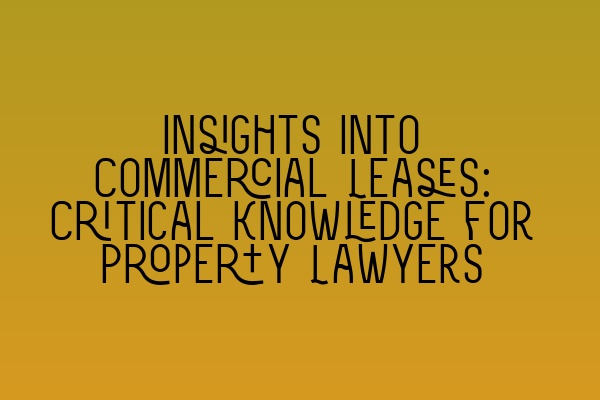Insights into Commercial Leases: Critical Knowledge for Property Lawyers
Commercial leases are a vital aspect of property law, and understanding their intricacies and implications is crucial for property lawyers. Whether you are a solicitor specializing in property law or a law student preparing for the Solicitors Qualifying Examination (SQE), gaining insight into commercial leases will significantly enhance your legal acumen and professional expertise in this field.
In this blog post, we will delve into the key aspects of commercial leases, uncovering critical knowledge that property lawyers must possess. So, let’s jump right in!
1. Definition and Types of Commercial Leases
A commercial lease is a legal agreement between a landlord and a tenant, allowing the tenant to occupy and use a commercial property for business purposes. There are various types of commercial leases, including full repairing and insuring leases, gross leases, net leases, and percentage leases. Each lease type has its own set of obligations and implications for both parties involved.
2. Essential Terms in a Commercial Lease
Commercial leases contain several essential terms that property lawyers must carefully scrutinize. These terms include rent, lease duration, rent review clauses, break clauses, repairing obligations, service charges, alienation provisions, and user covenants. Understanding the implications of each term and ensuring their fairness and enforceability is pivotal in protecting the interests of clients.
3. Negotiating Commercial Lease Terms
Property lawyers often play a vital role in negotiating lease terms on behalf of their clients. This involves careful analysis, negotiation, and drafting of clauses that protect the client’s rights and align with their business goals. Being well-versed in the nuances of commercial leases empowers lawyers to secure favorable terms and conditions for their clients.
4. Conducting Due Diligence
Before advising clients on entering into commercial leases, property lawyers must conduct thorough due diligence. This involves inspecting the property, reviewing relevant legal documents, examining the landlord’s financial stability, and ensuring compliance with statutory requirements. Diligent due diligence minimizes the risk of future disputes and ensures a smooth lease transaction.
5. Lease Renewals and Termination
When a commercial lease reaches its expiration, tenants may have the option to renew the lease. Property lawyers need to guide their clients through the renewal process, negotiate terms, and review the lease agreement. Additionally, lawyers must be well-versed in lease termination procedures, including the exercise of break clauses and surrendering leases.
6. The Impact of Legislation
Legislation plays a significant role in commercial leases. Property lawyers must stay up to date with changes in the law that may impact their clients’ commercial lease agreements. Key legislation to consider includes the Landlord and Tenant Act 1954, the Law of Property Act 1925, and the Equality Act 2010. Understanding these laws is crucial in providing accurate advice and ensuring compliance.
7. Dispute Resolution in Commercial Leases
Disputes can arise in commercial leases, and property lawyers play a crucial role in resolving them. These disputes may involve rent reviews, dilapidations, breaches of covenant, or disagreement over lease interpretation. Lawyers should be familiar with dispute resolution mechanisms such as negotiation, mediation, and litigation to protect their clients’ interests effectively.
As a property lawyer or a law student preparing for the SQE, deepening your knowledge of these critical aspects of commercial leases is essential for success. By comprehending the intricacies of lease agreements, negotiating favorable terms, undertaking due diligence, and resolving disputes, you can provide invaluable advice to your clients.
If you’re preparing for the SQE, check out our related articles for practice exam questions, study mocks, and preparation courses for both SQE 1 and SQE 2. Stay updated with SRA SQE exam dates to ensure you’re well-prepared when the time comes.
Remember, being well-versed in commercial leases not only enhances your expertise as a property lawyer but also enables you to protect your clients’ interests and contribute to successful lease transactions. So, delve deep into this critical area of property law and strive for excellence in your legal career!
Sources:
– SQE 1 Practice Exam Questions
– SQE 1 Practice Mocks FLK1 FLK2
– SQE 2 Preparation Courses
– SQE 1 Preparation Courses
– SRA SQE Exam Dates
